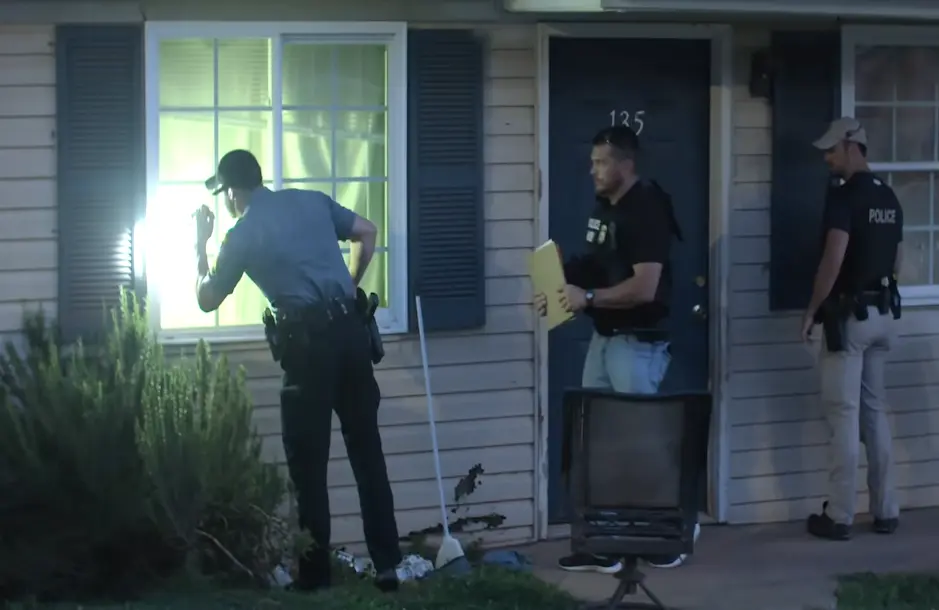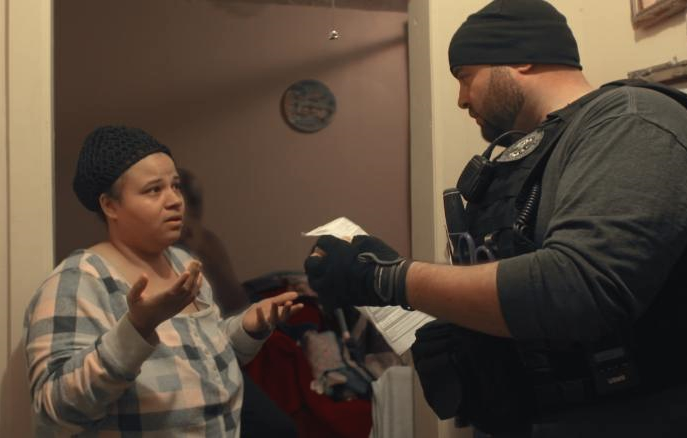No Wonder ICE Officials Don’t Want You To See Immigration Nation
-
 A screen grab from Netflix's Immigration Nation.
A screen grab from Netflix's Immigration Nation.The phrase “Abolish ICE” is one of those rallying cries that, like “Black Lives Matter” and “Defund the Police,” used to make no sense at all to most Americans. But after watching Immigration Nation, Netflix’s searing six-part insider look at the U.S. Immigration and Customs Enforcement, or ICE, you’re going to understand all too well why people are calling for its abolition.
Filmmakers Shaul Schwarz and Christina Clusiau embedded with ICE for two and a half years early on in the early Trump Administration. They filmed agents during a massive sweep through American cities as they took thousands of undocumented immigrants into custody. They followed refugee families who were separated at the border under an over-the-top Trump decree. And they observed bureaucrats moving undocumented individuals through deportation proceedings so prolifically that they make ICE under President Obama — once considered so gung-ho that his critics labeled Obama the “deporter-in-chief” — seem like slackers.
This deep access, and the compelling narrative the filmmakers weave out of their footage, makes Immigration Nation the most important documentary Netflix has fronted since Ava DuVernay’s 13TH. Even if it doesn’t convince you that ICE should be abolished, I guarantee you’ll be unsettled watching the agency’s response when a new sheriff takes over and demands the country be cleared of undocumented immigrants on a scale never seen before.
Schwarz and Clusiau had been trying to get permission to observe ICE since the early Obama administration. But it wasn’t until Trump’s people came in that they were granted access. According to a New York Times report, ICE officials were outraged when they saw where Immigration Nation was heading and tried to have the program’s release postponed until after November’s election. “ICE’s leadership expressed frustration that the documentary, which was supposed to be about ICE officers, included the stories of so many immigrants,” said the report. Apparently ICE’s leadership thought the couple were making an industrial film.
It’s true the filmmakers follow several families around as their deportation proceedings drag on. But the power of Immigration Nation is in the scenes that shows the rank-and-file officers at work, heartlessly — and sometimes happily — carrying out their orders to arrest, incarcerate, and deport.
“Now the administration has changed and we’re finally able to do our jobs,” says one ICE agent with undisguised glee. “It’s like the floodgates opened. It’s a different world.”

Unlike the FBI, another federal law enforcement agency whose leadership Trump doesn’t control, ICE is pretty much his sandbox. There hasn’t been a Senate-confirmed director of ICE his entire administration. What’s the point? Everyone knows who’s running the show.
With cameras rolling, ICE launches the first massive sweep of the Trump era. Instead of targeting violent criminals, ICE enters apartments and homes across America and packs off every undocumented person they find. These “collaterals,” as they’re casually referred to in the bureaucracy-speak, boost the numbers of the ICE field offices that they are required to report back to Washington.
Then there are the immigration courts. You’ll be surprised to learn they are separate from the criminal justice system, and that under Trump, judges have to make their numbers. This use of production quotas in both arrests and deportations is, we are told, unprecedented. If anything, Trump officials have simply borrowed the tactics used by police forces across the country, which set unspoken quotas to generate arrests and revenue, a practice within the NYPD that Stephen Maing’s riveting Hulu doc Crime + Punishment exposed.
In one scene from Immigration Nation, the directors ride along with an ICE officer named Brian, who makes it clear he is not into picking up collaterals. And then he takes a call from his boss, who tells him to start taking in collaterals. “Bring at least two people in,” he’s told. And so it goes.

Most of the ICE officers featured in Immigration Nation are people of color and women. The filmmakers seem to have gone out of their way to make ICE appear as culturally diverse, perhaps more diverse, than the people they’re rounding up and deporting. The officer who compares the Trump-ordered sweep to Christmas is Latino.
Early reporting on Immigration Nation has called attention to some of the questionable tactics used by ICE officers to gain access to people’s homes, as well as the callousness some officials show toward the people they detain. For the most part, though, what you see in this series is an almost Frederick Wiseman-like presentation of institutional behavior — people keeping their heads down, doing their jobs like the career civil servants they are. “I am the taxi driver that takes them from Point A to Point B,” says Christian, a top official in ICE’s New York bureau.
These scenes are juxtaposed with others from the lives of people fleeing Central American violence, fearing for their lives if ICE gets its way. Especially heartbreaking is the story of Bernardo, a Guatemalan army veteran who is separated from his son Emilio upon reaching the border. His wife and younger children remain back in Guatemala, and the deterioration of the family under the strain of forced separation is obvious — the father lingering sadly in detention, Emilio ordered to stay with an aunt in Florida who openly dislikes having him around, the anguished mother and wife back home who is receiving no income from America and has no idea what to do.
“The brilliance of any bureaucratic system whose net result is fear and trauma is that it’s big enough to break it down such that everyone just thinks they’re only moving papers or only doing a little piece,” a perceptive immigration-rights lawyer named Becca Heller says. “A very small number of people at the top design the system such that an incredible amount of terror or trauma result —but most people are completely divorced from that.” Immigration Nation forces us to look at the consequences of ICE’s actions, and ask if this is the cold, legalistic face we want to show the world.
All six episodes of Immigration Nation drop today on Netflix.
Aaron Barnhart has written about television since 1994, including 15 years as TV critic for the Kansas City Star.
TOPICS: Immigration Nation, Netflix, Immigration and TV, Trump Presidency